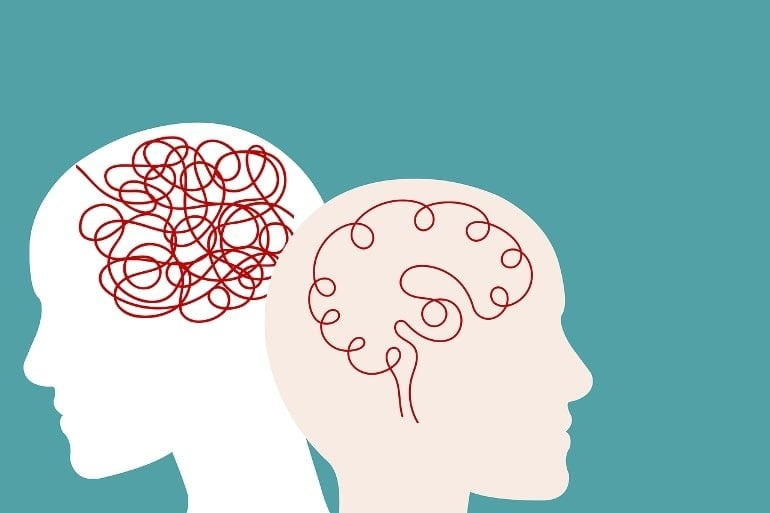No-one is born in the wrong body
How a recent issue is a very old problem
I want to pick up the issue of identity crisis, within our wider world of crises. In particular, how we understand who we are in relation to our bodies.
There is an explosion of dis-ease about bodies. Many of us wish our bodies were different, such as being taller or thinner, not bald, having fewer wrinkles, etc. But something more pernicious has taken hold of many in an extant way: the idea that who they are being fundamentally at odds with and out of step with their body. Something once strange to say has become commonplace: that the real me is extrinsic to my body. Recent statistics indicate that a notable portion of Gen Z identifies as transgender or non-binary.1
The surge in self identification is new. But at the heart of issues of the relationship between identity and our bodies is a something very old with a long history.
It is the mind(soul) - body problem.
So let’s take a look at what the bible/theology, biology and neuroscience say about this problem. How it has manifest in the past? How did we get to where were we are now? And how knowing that might we navigate the present better.
Biblical Anthropology
Biblical anthropology (also known as Christian anthropology or theological anthropology) is about the nature of humanity from a Christian and biblical perspective, i.e., what the Bible reveals about the origin, nature, and purpose of humankind and God. In other words, what does it mean to be human according to the Bible.
It differs from secular anthropology, which studies humanity through scientific, social, and cultural lenses without specific reference to divine revelation. How secular and Christian anthropology interface, or don't, is beyond my writing here. But I will say that a belief that scientific and theological accounts of human nature can work together underpins what I write. What follows below is made around that mode of complementarity.
In outline, a Christian anthropology reveals that:
Imago Dei: We are made in God's image, and aspects of God's image, such that being male and female, rational, creativity, relational, and having moral capacity, are reflected in us.
Dichotomous & Trichotomous: We are composed of two parts: body (material) and soul/spirit (immaterial). We are also composed of three parts: body, soul, and spirit.
Monistic/Holistic: We are an indivisible unity, where "body," "soul," and "spirit" refer to different aspects of the whole person rather than separate entities.
Fallen & Sinful: Sin, death (both physical and spiritual), result in alienation from God, and the corruption of human nature are part of human life and being. Due to our fallenness, human inclination is away from our telos, i.e who we were meant to be in God in creation and towards our own ends, and those of others.
Human Purpose and Destiny: We are created beings, by God, meant to have a relationship with Him, and co-create and care in his creation, with eternal purposes for who we become in this life.
Gender and Sexuality: The creation of male and female is more than evolutionary; it is central to God's image. Marriage, children, and community are part of the outworking of our identity in God.
Biological Anthropology
We have recently seen an increasing manifestation of a refusal to accept biological reality. This is not Christians refusing to consider evolution, but rather the widespread manifestation of people asserting that their inner sense of identity is authority enough to refute biological science. After the separation of Gender from Sex we now face a concerted effort by many to undermine the very notion of biological sex, claiming that sex is a fluid as gender. This is the realm of psychological and neuro-anthropological issue of identity, which we will get in a moment. But first, what is biological anthropology, and why is it important?
Biological anthropology, or physical anthropology, is the scientific study of human biology and evolution. It explores humans' biological and behavioural aspects, extinct ancestors, and related non-human primates. It uses scientific methods to understand our place in nature and the processes that have shaped our biological history and present diversity.
In short, human biology is as evolutionary biologist Dr Heather Heying would say, ancient, flawed, and exquisite.
Ancient: Our biology formed over a very long period of time. Aspects unique to humans include how we walk and see, how our brains and bodies can work in concert, and how body language, speech, and long childhood development make us biologically human.
Flawed: Our bodies have built-in trade-offs, such as long, dangerous pregnancies that allow our larger brains to form, sharing food and breathing space in our bodies, etc. Our bodies replicate flaws between generations.
Exquisite: We are exquisite in our adaptability to different environments, with height, skin colour, body fat responses to temperature, etc.
Binary and Bimodal: There is no Third Sex
And we are binary in terms of sex, or possibly bimodal, where this is a very minute distributional overlap between the sexes for a very few people. Almost all human beings are the sex recognised at birth, their genitalia, chromosomes, and gametes aligned with being either male or female. A tiny percentage of people have complications around their sex, such as being intersex.2 But even for those people they are biologically confirmable as being either male or female. There is no third sex. And as yet no human being has ever changed there biological sex, nor are they able to.
Sexual reproduction is likely a 2 billion years old process. We all had a mother and father, who had a mother and father, etc., going back hundreds of millions of years, with humans as we know now, emerging 300,000 years ago.
But biology is only part of our identity and who we are. We are more than our genomes and biological anthropology.
Neuroscience Anthropology (Neuro-anthropology)
Neuroanthropology is about the intricate relationship between identity and the brain, recognising that they are not independent entities but instead mutually shaping forces. It is about the neural correlates of how lived experiences within specific cultural contexts leave identifiable patterns in brain structure and function, influencing and perpetuating cultural expressions and behaviours.
What that means in outline is:
Bio-cultural Co-constitution: Our brains are not a blank slate, but are formed in life experiences and cultural contexts.
Holistic and Interdisciplinary: Insights of neuroscience explore who we are from fields of cognitive science, psychology, and linguistics.
Emphasis on Variation and Specificity: Our neurobiology has universal aspects for all humans. However, life experience and development lead to the "specificity" of those life moments being "inscribed" in the brain.
In other words, we are more than our material and physical existence. Identity is made up of what we feel, love, desire, and experience, which becomes part of our neurobiology.
The Mind-Body Problem: In History
So, coming back to our growing issue of large numbers of people expressing that their sense of who they are is at odds with their bodies, how does that compare to similar manifestations of this dilemma in History?
Plato: Almost 2,400 years ago, Plato saw the body as something to escape from into a higher dimension of being. Our body is a prison in which the soul is trapped. Death is a prison break for the soul.3
Aristotle was Plato's most outstanding student. He disagreed with Plato's view of the soul and body. Instead, he saw the soul as the thing that animated a living thing. Souls are in an inseparable union with our bodies. It is this idea that Thomas Aquinas develops in the 13th Century and Christian Anthroplogy.4
Aquinas, in the 13th Century, developed the idea that we are a hybrid of body and soul. I am the real me of body and soul; I am matter animated by a living principle. The soul exists but is not separate and trapped from who I am. We have one rational soul as the organising principle for our lives. There is no higher real me, pitted against my body.
If Plato created the mind body problem, Aristotle sought to remedy it, and Aquinas deployed the remedy. So, how have we come full circle in many ways, where we are today, where the soul is subsumed as part of our material existence. And our bodies are something to be escaped from to a higher existence for identity. Some of the steps to that understanding were made by Descartes and Sartre.
Rene Descartes in the 17th century, distinguished between the res cogitans (a thing which thinks) and the res extensa (a material thing). This led him to articulate that metaphysically, what is the only real thing is thinking, i.e the existence of a human being is the fact of thinking and awareness, separate from the material and our bodies. Gilbert Ryle objected to this Cartesian dualism that regarded body and mind as separate but complementary necessities, famously describing Descartes's idea as 'the Ghost in the Machine', where the Ghost of a mind gives life to the Machine of a body.
Jean-Paul Sartre in the 20th century, takes things to a new level of separation, where freedom precedes any definition that I give to myself or the world, others, or God can give to me.5 This radical freedom implies that humans are responsible for creating their own identities and meanings in life through their actions, a process he refers to as "self-creation." Sartre centred on personal autonomy and responsibility, whereas later postmodernism leans towards the role of societal and cultural factors in self-construction of identity.
So, after nearly 2,500 years, Plato's problem is resurrected and extended. That the real me, is hidden and extrinsic to my body. This awkward relationship with the material and my body is one where I am a prisoner in my body, a Ghost in the Machine, where freedom of self-creation overrides biological facts, and is simultaneously empowered by the neuro-cognitive but also captive to the trauma of lived experience. There is no givenness to who I am; I am self-created, in a mode that is at odds with the notion of God creating me and my identity being given to me, received from God, mediated through, belief, tradition, and community.
Will the real me step forward?

So how with all the above might we better understand and respond to our current dis-ease over our bodies and identity, in a way that runs with the grain of biology, neuroscience and Christian anthropology?
Biology: We should accept biology and resist the denial of our creatureliness. Christianity has had a mostly positive, though complex and nuanced view of biology and the materiality of humanity. Our bodies are not something to escape from, but to receive as they are, from a God who created us, within a material world that is Good. In Christ, God does not bypass our humanity, but enters it fully. Jesus is born as a male, a baby who grows, develops and dies. And even in resurrection, he does not leave his body behind, but it continues into a new dimension of life with God. Because of the fall, and experiences of life, we might well feel at odds with our bodies. But we are not born into the wrong bodies.
Neuroscience: A great deal of who we are, is universal to all human beings, but is also particular, being shaped by our life experiences and formational environmental factors and culture. These experiences can transcend our biological inheritance but not deny it. I may explore an existence that is more than any aspect of my biology. I am more than my the condition and history of my body, and any trauma of the past. But who I am neuroanthropologically should still align holistically with my biology. Neuro-anthropology does no trump biology or vice versa. Our bodies do keep the score of life experience. But we are more than the sum of our life experiences and any traumas.
Christian Anthropology: What I have just said about biology and neuroscience has already made use of Christian anthropology. We are made in the image of God, materially and spiritually, with a soul that does not need to escape, nor is a Ghost in the machine. We are not fundamentally and naturally at odds with our bodies. Our biology is part of our giveness from our creator, and neuroscience helps us understand how we have been formed, sometimes in ways that have pitted us against our created identity. Psychology can help us understand the deforming forces against our identities. But for Christians biology and neuroscience are not the principal determiners for identity, faith in a God who participates in our formation is.
In short we are not free to be whoever we want to be. We will only discover who we really are, in relationship with Jesus, and God our creator. We are not self created, but receive who we are from God in relationship to Jesus and also through others.
Recovering the Soul
We live at a time when the self-created self is the new soul.
The idea of the soul has slipped away from us. In our over psychologised world, the 'self' has become the substitute for the soul. We are obsessed with ourselves and self. And we are becoming sicker as a result, not healthier. And the soul has been relegated to an escape raft in death for our self to climb into after the life with identity we have made for ourselves.
In the bible, in James 1, we have the passage about a person who catches a glimpse of themselves in a mirror but goes away and forgets who they are. James 1:24 literally means to see who God in his Genesis creation intended us to be, to catch a glimpse of who we were meant to be within the image of God and to walk away, forgetting who we are.
We are invited to take hold of that glimpse and in relationship with God, receive the identify he want to give us, that includes:
How we are fearfully and wonderfully made, in his image.
That in the body of Christ as part of the body of Christ, and with Christ we make up - are given - in our bodies our identity in relationship. Our dis-ease with our bodies, finds healing and reconciliation in relationship to Christ’s body.
That healing for our dis-ease and malformation, psychological, and spiritual is possible through science, psychology directed by the telos of a life ordered around Jesus Christ. We can be transformed by the renewing of our minds in Christ, our neurobiology regulated and formed with Him.
So how do we begin to access this Christian anthropology and basis for identity? I believe it is to recover the idea of the soul, the kind Aquinas showed us and that we have lost. I’ll be writing about that recovery of the soul very soon. Do subscribe to receive updates of all new posts I write.
See https://www.statista.com/statistics/1331358/sexual-orientation-gender-identity-us/ and https://time.com/6275663/generation-z-gender-identity/
The true prevalence of intersex is seen to be about 0.018% of people, see https://pubmed.ncbi.nlm.nih.gov/12476264/
See 1.2 of History of dualism
Ditto
Ditto








Thank you so very much for thinking and writing about this topic. There is, clearly, a need for a "Christian anthropology" of the mind-body-gender problem and this is valuable on its own terms. And whilst I recognise the good sense in defining your boundaries - in this piece the secular and Christian anthropology interface is out of scope - I also urge you to also share your insights on the secular / Christian interface. As an 'ordinary Christian' I have found vanishingly little Christian input as I have navigated the last 15 years working in the public sector, discharging the 'public sector equality duty' with a mix of passionate commitment, guardedness and soul-searching. I suspect I'm not alone in feeling that there has been a dearth of theological or pastoral support from the church around the dilemmas many of us navigate in our lives. Please keep going - I will be listening with interest and attention.
Jason, thank you for a thought-provoking article, which tackles the pressing issue of identity and the body. A very robust integration of biblical, biological, and neuroscientific perspectives. Your historical overview of the mind-body problem, from Plato to Sartre, resonates strongly with Carl Trueman’s analysis in “The Rise and Triumph of the Modern Self.” Trueman argues that the modern self has become “psychological,” where identity is rooted in inner feelings and autonomous self-creation, often detached from material or divine realities. Your critique of the “self-created self” as a substitute for the soul seems to echo Trueman’s concern about the shift from a God-given identity to one shaped by expressive individualism.
Could you elaborate on how Christians might practically navigate and lead culture through the tension between affirming biological givenness and addressing the real psychological distress of those who feel at odds with their bodies. Trueman suggests that the church must recover a theological vision of the self to counter cultural narratives. How might your call to “recover the soul” align with or expand on this, especially in pastoral or communal contexts where neuroscience and psychology intersect with faith?